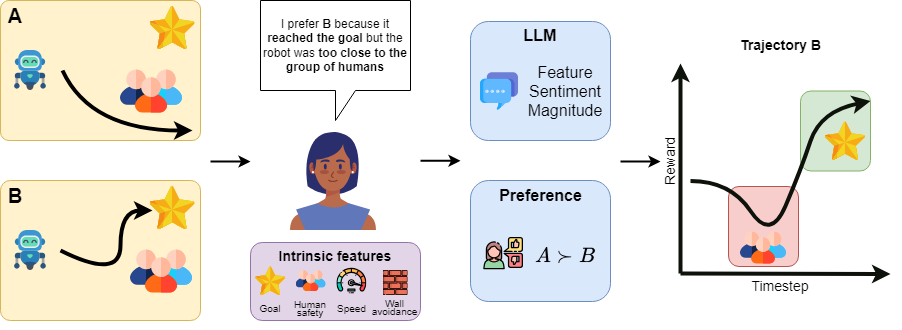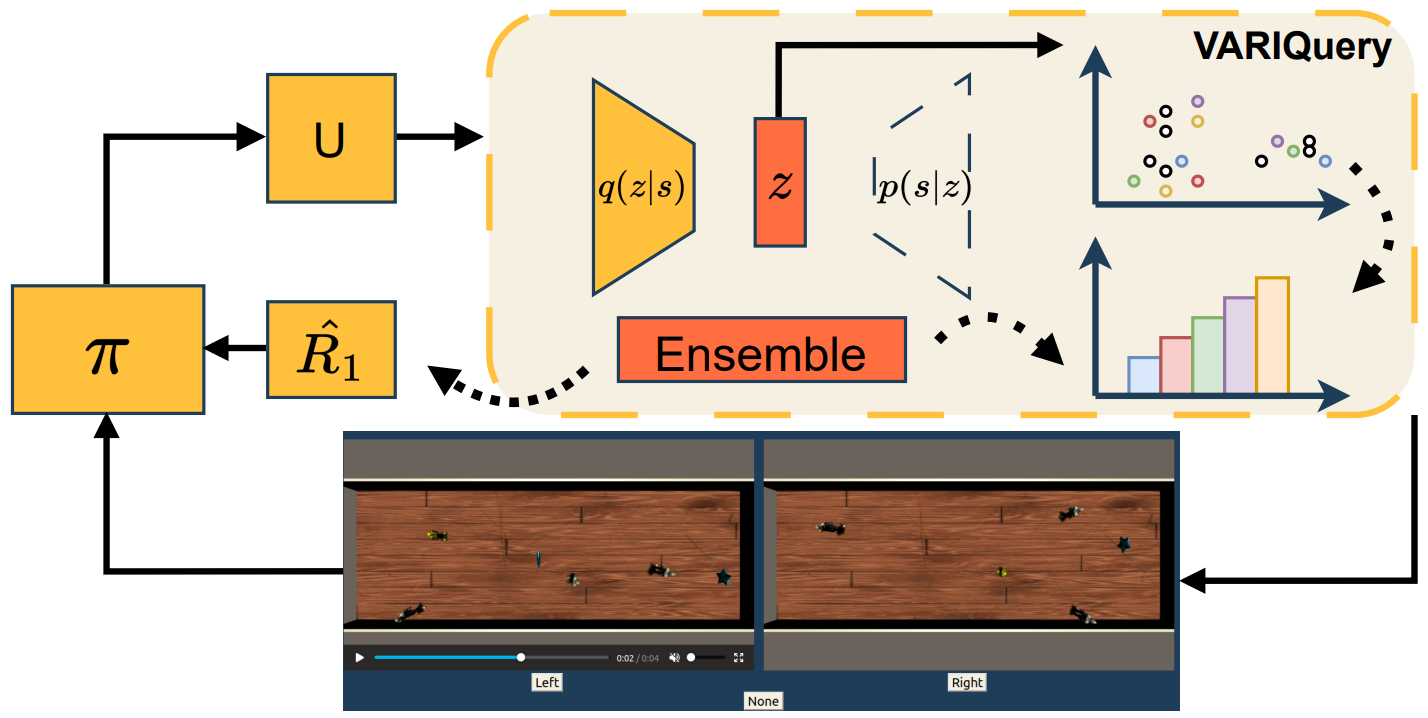Jump to selected publications.
Selected Publications
PREDILECT: Preferences Delineated with Zero-Shot Language-based Reasoning in Reinforcement Learning
Simon Holk*, Daniel Marta*, and Iolanda Leite
HRI'24
This paper aims to utilize the zero-shot capabilities of LLM in order to increase the granularity
of preference-based feedback by extending my previous work. By letting the user give optional auxiliary
textual descriptions of their preference we ensure that the reward function align with what the human
actually wants as well as improve the sample-efficiency by avoiding over-sampling.
POLITE: Preferences Combined with Highlights in Reinforcement Learning
Simon Holk, Daniel Marta, and Iolanda Leite
ICRA'24 - Nominated for best HRI paper, best student paper, and best conference paper.
This paper aims to improve the granularity of preference-based feedback by adding temporal trajectory segmentation
to highlight positive and negative parts. This helps avoid the uniform assignment of responsibility across the whole trajectory
while it might just be some part that was actually preferred. The highlights are then optimized as an auxiliary task ensuring
a improved shared representation.
SEQUEL: Semi-Supervised Preference-based RL with Query Synthesis via Latent Interpolation
Daniel Marta*, Simon Holk*, Christian Pek, Jana Tumova, and Iolanda Leite
ICRA'24
By utilizing semi-supervised learning we can improve the sample-efficiency by augmenting the preferences provided by humans.
We train a VAE to learn a latent representation and thereafter synthesise new queries from existing ones by interpolating the
trajectory pairs. The idea is that if a user prefers traj A over traj B, even if they are a bit closer (like 10%) they would
still prefer it. This helps the feedback generalize better.
VARIQuery: VAE Segment-based Active Learning for Query Selection in Preference-based Reinforcement Learning
Daniel Marta*, Simon Holk*, Christian Pek, Jana Tumova, and Iolanda Leite
IROS'23
This paper addresses the
often-overlooked aspect of query selection, which is closely
related to active learning (AL). We propose a novel query
selection approach that leverages variational autoencoder (VAE)
representations of state sequences. In this manner, we formulate
queries that are diverse in nature while simultaneously taking
into account reward model estimations.
Aligning Human Preferences with Baseline Objectives in Reinforcement Learning
Daniel Marta, Simon Holk, Christian Pek, Jana Tumova, and Iolanda Leite
ICRA'23
By considering baseline objectives to be designed
beforehand, we are able to narrow down the policy space, solely
requesting human attention when their input matters the most.
To allow for control over the optimization of different objectives,
our approach contemplates a multi-objective setting. We achieve
human-compliant policies by sequentially training an optimal
policy from a baseline specification and collecting queries on
pairs of trajectories.
Simon Holk*, Daniel Marta*, and Iolanda Leite
HRI'24
This paper aims to utilize the zero-shot capabilities of LLM in order to increase the granularity of preference-based feedback by extending my previous work. By letting the user give optional auxiliary textual descriptions of their preference we ensure that the reward function align with what the human actually wants as well as improve the sample-efficiency by avoiding over-sampling.
Simon Holk, Daniel Marta, and Iolanda Leite
ICRA'24 - Nominated for best HRI paper, best student paper, and best conference paper.
This paper aims to improve the granularity of preference-based feedback by adding temporal trajectory segmentation to highlight positive and negative parts. This helps avoid the uniform assignment of responsibility across the whole trajectory while it might just be some part that was actually preferred. The highlights are then optimized as an auxiliary task ensuring a improved shared representation.
Daniel Marta*, Simon Holk*, Christian Pek, Jana Tumova, and Iolanda Leite
ICRA'24
By utilizing semi-supervised learning we can improve the sample-efficiency by augmenting the preferences provided by humans. We train a VAE to learn a latent representation and thereafter synthesise new queries from existing ones by interpolating the trajectory pairs. The idea is that if a user prefers traj A over traj B, even if they are a bit closer (like 10%) they would still prefer it. This helps the feedback generalize better.
Daniel Marta*, Simon Holk*, Christian Pek, Jana Tumova, and Iolanda Leite
IROS'23
This paper addresses the often-overlooked aspect of query selection, which is closely related to active learning (AL). We propose a novel query selection approach that leverages variational autoencoder (VAE) representations of state sequences. In this manner, we formulate queries that are diverse in nature while simultaneously taking into account reward model estimations.
Daniel Marta, Simon Holk, Christian Pek, Jana Tumova, and Iolanda Leite
ICRA'23
By considering baseline objectives to be designed beforehand, we are able to narrow down the policy space, solely requesting human attention when their input matters the most. To allow for control over the optimization of different objectives, our approach contemplates a multi-objective setting. We achieve human-compliant policies by sequentially training an optimal policy from a baseline specification and collecting queries on pairs of trajectories.




